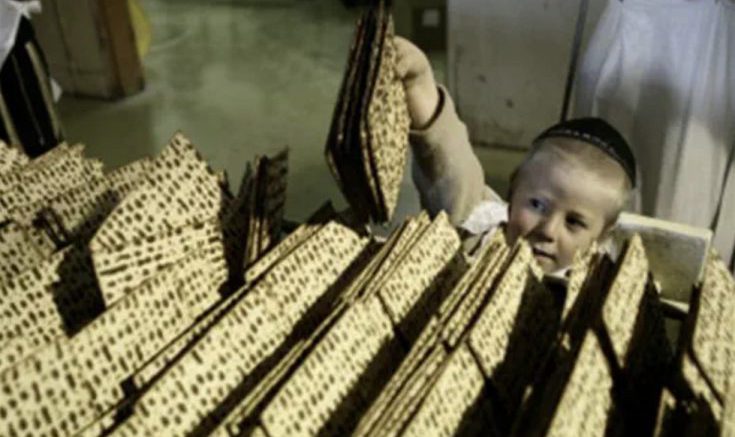The matzah comes to remind us of faith, and therefore its entire process of preparation must be done with great care. One must guard the matzot designated for the Seder night in a special manner so that they do not become chametz.
Guarded (Shmura) Matzot for the Seder Night
There is a positive commandment to eat matzot on the Seder night, as it is said: “In the evening, you shall eat matzot” (Exodus 12:18). One must guard the matzot designated for the Seder night in a special manner so that they do not become chametz, as it is said: “And you shall guard the matzot” (Exodus 12:17).

Some poskim (Jewish halakhic decisors) say they must be guarded from the time of the wheat harvest (Rif, Rambam), and some say it is sufficient to guard them from the time of grinding (Rosh, Rashi, and others). Additionally, the poskim are divided on whether the guarding must be done with explicit intent for the sake of the mitzvah (Sheiltot and Rashba), or if it is sufficient to simply ensure they do not become chametz, without the need to intend them specifically for the mitzvah (Ra’ah).
In practice, on the Seder night, it is customary to be meticulous and eat matzot that have been guarded from the time of harvesting, and from the time of kneading, special care is taken to guard and bake them for the sake of the mitzvah. And although, according to halakha, one can fulfill the mitzvah with matzot that have been guarded only from the time of grinding, nevertheless, ideally, one should fulfill the mitzvah of eating matzah on the Seder night with matzot whose wheat has been guarded from the time of harvesting (Peninei Halakha: Pesach 12:2-3).
Some who are meticulous eat specifically handmade matzot for the sake of the mitzvah, because some say that the matzot used to fulfill the mitzvah of eating matzah on the Seder night must be baked with special intent for the sake of the mitzvah, and since a machine cannot have intent, it follows that one cannot fulfill the mitzvah with machine-made matzot.
The opinion of most poskim is that machine-made matzot are kosher from the outset for the mitzvah of the Seder night because even the intention made when activating the machine “for the sake of matzat mitzvah” is effective, and this is considered as having made the matzot for the sake of the mitzvah. Additionally, according to some early authorities, there is no need for special intent during the making of the matzot; rather, the mitzvah is merely to ensure they do not become chametz.
In practice, machine-made matzot are kosher from the outset for fulfilling the mitzvah of eating matzah on the Seder night, and there is a hidur (enhancement) in using handmade matzot.
Is It Proper to Buy Guarded Matzot for All of Pesach?
Q: During the rest of Pesach, is it proper to enhance the mitzvah and buy matzot that have been guarded from the time of harvesting, or is it sufficient to use regular matzot, which cost about a third of the price of the guarded ones?
A: There are two aspects to this question:
A) Regarding the mitzvah of eating matzah.
B) Concern of chametz.
- A) The Mitzvah of Eating Matzah
According to some early and later authorities (Rosh, Gra), there is a mitzvah to eat a ‘kezayit‘ (olive-sized portion) of matzah at two meals each day of Pesach. However, for this purpose, one may use regular matzot because, although they are referred to as matzot that are not guarded, in truth, they are guarded from the time of grinding. Therefore, in times of need, even on the Seder night, one can fulfill the mitzvah with them, and certainly, one can fulfill the mitzvah of eating matzah with them during the seven days of Pesach.
Concern of Even the Slightest Amount of Chametz in Regular Matzot
- B) Due to the concern of chametz, there is an enhancement to eat matzot that have been guarded from the time of harvesting only, because, in reality, regular matzot sometimes contain a certain amount of chametz. Although most poskim rule that it is nullified in sixty (batel b’shishim) and is therefore kosher, some poskim are stringent and hold that chametz on Pesach is not nullified even in a ratio of one in a thousand.
Regular Matzot Compared to Guarded Matzot
When baking regular matzot, the goal is to produce as many matzot as possible quickly, in order to lower the price for the masses of Israel, whereas with guarded matzot, greater meticulousness and enhancement are applied.
The wheat for the guarded matzot is harvested before it dries, so even if much rain has fallen on it while still connected to the ground, it has certainly not become chametz, as it still draws life from the ground. After harvesting, care is taken to store them in a dry place, so they do not contain grains that have gotten wet and fermented. However, in regular wheat, which is generally imported from abroad and used for other matzot, it is likely that some grains have fermented due to rain after drying in the field or water that sometimes remains at the bottom of storage facilities.
Even during the kneading process, there is a significant difference between the two. When baking shmurah matzot (guarded matzot), every less than 18 minutes, the machine is stopped, its parts are dismantled, and they are thoroughly cleaned. In contrast, when baking regular matzot, the machines continue operating continuously for many hours, and while they run, the dough flow is stopped periodically, and the machine is cleaned as much as possible. It is clear that this cleaning has value, but it is not perfect, and it is likely that from time to time, chametz particles that have remained in the crevices of the machine for more than 18 minutes become leavened and pose a concern of mixing back into the matzah dough.
Explanation of the Dispute
At first glance, since it is likely that regular matzot contain even the slightest mixture of chametz, it would seem that everyone should be stringent and eat shmurah matzot. However, as a general halakhic rule, any forbidden substance that is mixed in becomes nullified in a ratio of 1:60 (batel b’shishim). Accordingly, both the fermented wheat and the dough particles remaining in the machine are nullified in sixty.
Indeed, our Sages were stringent and ruled that chametz during Pesach is not nullified even in a ratio of one in a thousand (afilu b’elef lo batel). However, according to most halakhic authorities, if the mixture occurred before Pesach, it was already nullified in sixty, and is no longer forbidden (Shulchan Aruch, Orach Chaim 447:4).
Nevertheless, there is reason to be stringent, as some authorities argue that even chametz that was nullified in sixty before Pesach is ‘reactivated’ (chozer v’ne’or) once the holiday begins, and re-renders the entire mixture forbidden (Rambam and Rashba).
While in practice, one may rely on the lenient opinion, as it is the majority view, and additionally, this debate pertains to a rabbinic prohibition—since it was our Sages who ruled that chametz on Pesach is not nullified even in a thousand—there is certainly an enhancement (hidur) in eating matzot that are kosher according to all opinions.
Summary of Halakha
Regular matzot, which are guarded from the time of grinding, are kosher from the outset for all of Pesach, and even according to those who hold there is a mitzvah to eat matzah throughout the seven days of Pesach, they fulfill the mitzvah with them. Those who are meticulous eat matzot that have been guarded from the time of harvesting, mainly because they are more carefully guarded from becoming chametz.
Matzah – The Bread of Faith
Matzah comes to remind us of emunah (faith), as we say in the Haggadah:
“This matzah that we eat – why? Because the dough of our ancestors did not have time to rise before the King of Kings, the Holy One, Blessed be He, was revealed to them and redeemed them.”
Similarly, in the Zohar (Part II, 183:2), matzah is called: “Meichla D’Mehemenuta” – the bread of faith.
Since matzah symbolizes faith, it is understood that its entire process of preparation must be done with great care, as any defect in faith will later cause great destruction in the world.
Continuation of the Discussion on Faith in Relation to Hinduism
On the Social Castes in Hinduism
About a month ago, I wrote that, according to halakha, Hinduism is considered a form of avodah zarah (idolatry) b’shituf (worshipping other beings together with God). Therefore, it is entirely forbidden to Jews, but according to most halakhic authorities, it is permitted to Noahides. I will now continue to examine another aspect, through which one can understand the freedom and power of choice in the Jewish stance.
With the support of Hinduism, a rigid system of four castes (varnas) developed, meaning social classes:
- Brahmins – Religious figures.
- Kshatriyas – Warriors.
- Vaishyas – Workers.
- Shudras – Servants.
Additionally, there was another class beneath them—the “Untouchables,” whom members of the four castes distanced themselves from, refrained from touching, and avoided eating and drinking anything they had handled. The most degrading jobs were assigned to the Untouchables, and they lived in extreme poverty. The proportion of the “Untouchables” class is about 20% of society, and to this day, many of them suffer from severe discrimination, despite India’s democratic constitution being in effect for nearly 80 years and the government’s educational efforts to moderate attitudes toward them.
The concept that underlies the caste system is the belief that a person’s soul undergoes a continuous process of reincarnation: birth, life, and death—repeating in cycles. According to one’s karma—meaning, all of a person’s actions in previous lifetimes—the soul will be reincarnated into the next cycle of life. If one acted badly, including behaving improperly toward the various gods, one accumulates bad karma and will be reborn into a lower caste, or even as an animal, a plant, or an inanimate object. Conversely, if one performed good deeds and honored the gods, which represent the different forces in the world, one’s karma will be good, and they will be born into a higher caste. According to this belief, a person has no reason to complain about their social status, as they were born into their caste based on their actions in past lives.
Therefore, a person’s tikun (rectification) depends on their acceptance of their fate, as well as the forces of nature and the various gods, including the negative ones, and within this framework, they must strive to act properly. There is indeed some truth in recognizing that a person’s fate is largely dictated from birth, as family background, social standing, and genetic makeup greatly influence one’s destiny. There is also value in accepting one’s fate rather than striving for a status beyond one’s reach. Moreover, in Hindu thought, a person can significantly change their social status—but this will happen only in the next reincarnation, through accepting their fate in the current life, and doing their best within it.
The Jewish Perspective
In contrast, Judaism acknowledges that everything a person is born into is divinely ordained through hashgacha pratit (Divine Providence). However, the ultimate goal is for each person to elevate themselves and advance as much as possible during their lifetime on earth, for faith in the Infinite God constantly drives a person to strive for endless growth. Therefore, in Judaism, even a mamzer (a person of illegitimate birth), whose lineage is so flawed that they are forbidden to marry a regular Jewish woman, can still study Torah and attain a spiritual level higher than that of the High Priest. Similarly, concerning the poor—although there is a mitzvah to extend kindness to them and sustain them with dignity—the ultimate goal is to help them escape the cycle of poverty and become self-sufficient.
For this reason, every Jewish community is commanded to provide full education in Torah, ethical conduct (derech eretz), and good deeds to all children, including the poor, so they can stand on their own. Not only that, but our Sages instructed: “Be cautious with the children of the poor, for from them will emerge Torah” (Nedarim 81a). Hardship and deprivation can serve as powerful motivators for immense personal growth.
This is one of the fundamental lessons we learn from Passover.
On the upcoming holiday of Passover, we will once again recall that we were all slaves in Egypt, lower than even the lowest caste. Yet in His love for our ancestors and for us, God chose us and offered us the opportunity to become His people. We accepted, and thus we became God’s nation, bringing His word and blessings to the world.





